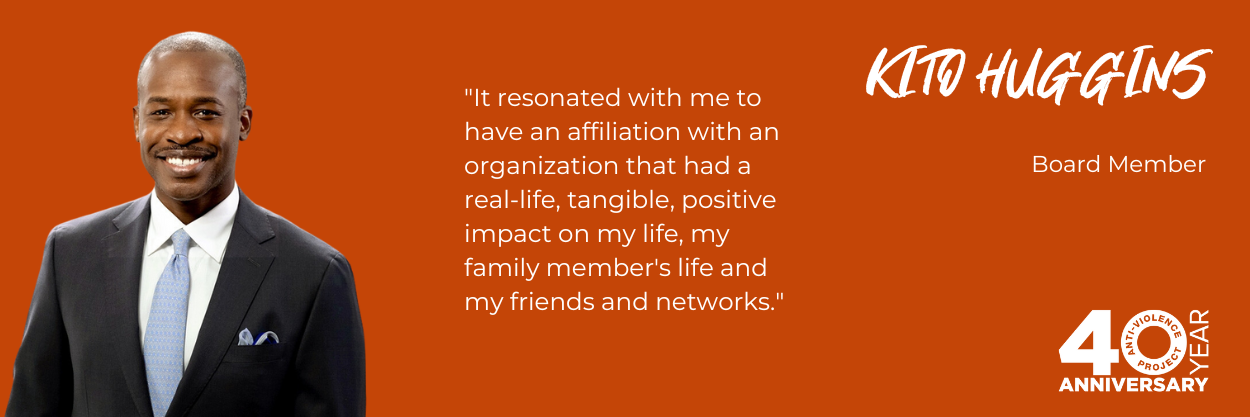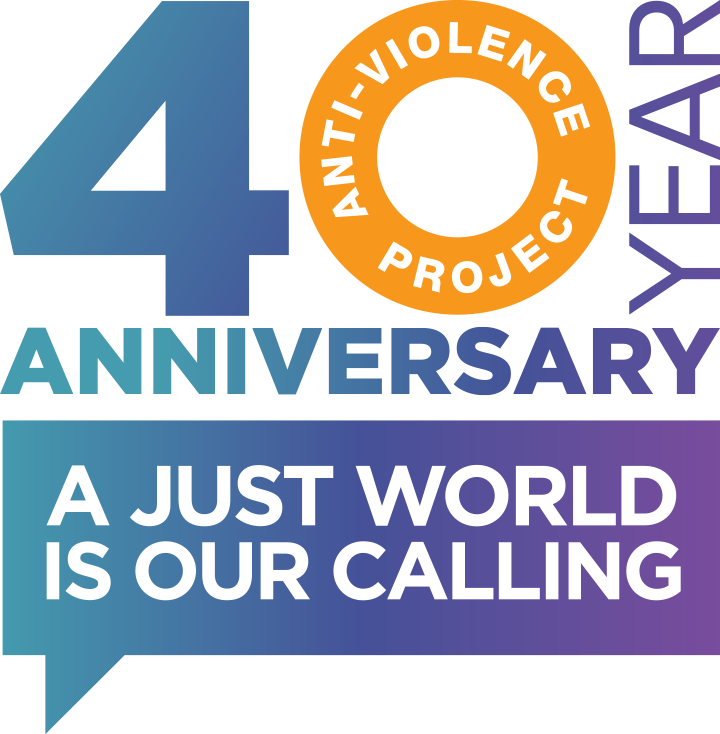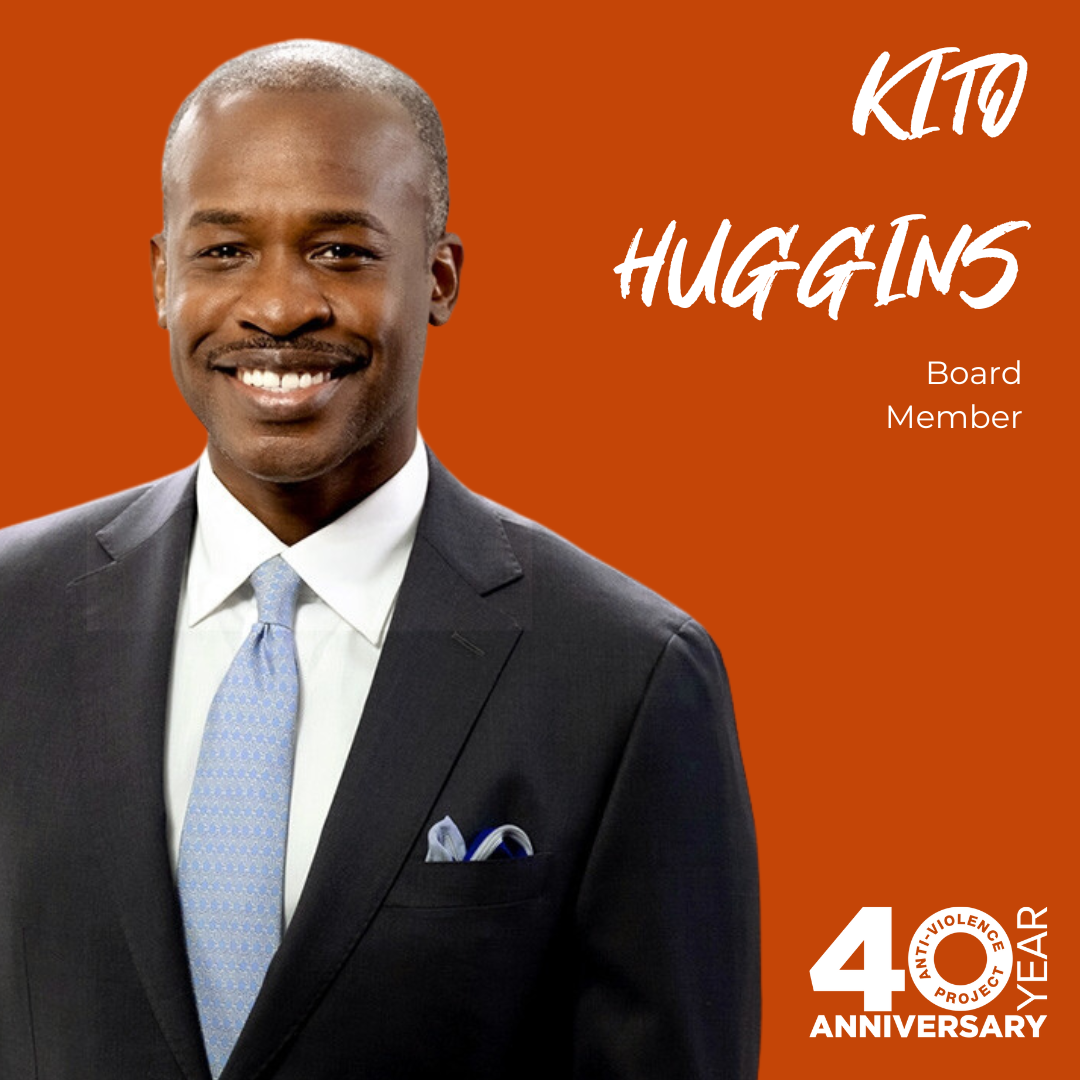
Kito Huggins has been a board member of AVP since 2018, also serving as the board chair until December 2023. Kito’s five years have been full working with “an organization that had a real-life, tangible positive impact.” From how AVP supports survivors, to their work with incarcerated populations, Kito discussed the importance of working with LGBTQ advocacy organizations that create meaningful change.
Here we talked about aligning with your values, activist organizations and resources and how AVP centers the most vulnerable among us.
How did you first get involved with AVP’s work?
I was first introduced to AVP by a supporter many years ago. He told me about AVP because his friend, Rich Palermo, who was the board chair at the time, was looking for candidates for board members to join. I was working for an investment bank, in the midst of a major financial crisis, which spurred the Great Recession of 2008. At the time, it wasn’t optimal for me to join because I was just really distracted. But, I was very much intrigued by the mission.
Years later, I met additional board members who shared thoughts that, given my passion for the issues and AVP’s mission, I would be a great fit for the Board. So, I attended the Courage Awards. I just remember being very inspired by the people that I met. It felt like a different kind of organization from the other LGBT advocacy organizations out there.
It resonated with me to have an affiliation with an organization that had a real-life, tangible, positive impact on my life, my family member’s life and my friends and networks.
What do you feel sets AVP apart from other LGBTQ+ advocacy groups?
AVP, most respectfully, is a scrappy organization. It’s nimble. It is an activist organization. It is a service organization. I just saw how its work had a direct impact on my life as a cisgender, Black, gay male who’s just navigating the streets of New York or going about my day-to-day life. I felt like the work that it did certainly was in my best interest.
And then, as I learned about the work that it does even nationally to support maybe smaller organizations. For me, it felt like [AVP] had a more refined focus than some of the other organizations that do great work, [and] this aligned with my values.
Do you have a moment that stands out to you from your time at AVP?
I think I’ve always been drawn to people who are, I don’t love the term, underdogs, but certainly, people who have intrinsic value that’s overlooked. Maybe as someone who had been the subject of bullying and intimidation at times, I felt like any organization that stands up for those that have that internal power but just don’t maybe have the resources or the networks, and they just need help. That’s always resonated with me.
I’m thinking of the Layleen Polanco family and the advocacy in getting that story out to demand justice for her. That makes me incredibly proud because these are otherwise stories that would go unnoticed or ignored. But, AVP, at its roots, is an activist organization that will confront all of us when we’re going about our day-to-day lives to understand the atrocities that are occurring for so many people in broad daylight.That was an amazing moment that I’m very proud of.
uring the summer of 2020, we received a transformational gift from Jack Dorsey, and we are now investing in our technological infrastructure. We have a 24/7 bilingual hotline where people call in when they are observing or experiencing moments of violence and intimidation. But the pandemic has taught us that you have to communicate in other ways besides picking up a phone. And, to the extent we can use this pivotal inflection point to rethink how we deploy services through technology, and the fact that we were able to share our mission, and this leader in tech understands what we do and then invests in that way, that was also a huge moment for the organization during my tenure.
I really have to give so much and share my appreciation for the staff of AVP. This is a group of committed people and volunteers who has to do this work, many times in under-resourced ways or ways where we didn’t have the full panoply of services or resources at their avail, but yet in the midst of remote work and having to take care of their own families and all the exponential issues that came to our clients, they were still resilient. That gives me tremendous pride.
And so, there are so many stories of volunteers and staff members that would personally, with masks on, in the midst of quarantines, take the services to the clients that need them. The fact that we could continue those operations and redefine or reframe how we served the most vulnerable populations, I think that is something that’s worthy of acclaim.
What do you carry from the work into the rest of your life?
It might sound cliché, but you’ve certainly heard it before, “To those whom much is given, much is expected.” I feel like we all need to take a bit of time every day to place ourselves in the shoes of other people and show compassion and grace to those that are not as fortunate that do not have the same life story. This work compels me to think about how we are centering the needs of vulnerable populations.
And I might add, these are vulnerable populations not because they are weak but because many of them are easily targeted. The courage it takes to be one’s authentic self even when there are forces and people, groups out there that would want to just erase their existence. We have to protect those folks who are the most targeted because, to be quite blunt, I see them on the frontlines. We’re seeing this today. When you remove their rights, when you say their lives don’t matter, when you do that not just in word but in deed, then eventually, when they’re gone, who’s going to protect you? So, particularly for our Black trans sisters who are targeted and who struggle with the day-to-day vitriol, and I would describe it almost as a cavalier indifference to their existence, we have to lift them, we have to center them. We have to divert resources, attention, and all of the things.
So, it’s impacted me. I just think that my life is intrinsically tied to their, not just survival, but how they thrive in life. Because if they’re not, then I’m not, and you’re not, and we’re all in this together. So, I think this work allows me to think about others. But, I feel like we all should be in the daily pursuit of just thinking empathetically.
Do you have anything else you want to share?
Even the people who cause harm, we know that even those people often are victims of harm themselves. And so, they are the product of the traumas that were inflicted upon them.
I certainly hate the acts that they perpetrate. We’re in this work to educate them. Ultimately, advocacy means changing hearts and minds and changing behaviors. Because, I believe if you change mindsets, you can change behaviors. And, if you change behaviors, we can change patterns, and collectively we can change a culture. I think AVP, when it’s doing its greatest work, is when it’s involved in the mindset shift for people and providing data and compelling stories that convict people to do things differently.




